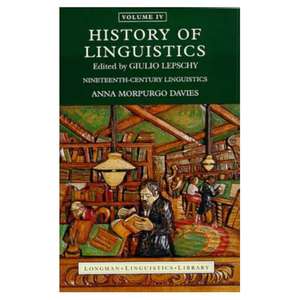History of Linguistics, Volume IV: Nineteenth-Century Linguistics: Longman Linguistics Library
Autor Anna Morpurgo Davies, Giulio C. Lepschyen Limba Engleză Paperback – 9 ian 1998
In Volume IV: Nineteenth Century Linguistics, Anna Morpurgo Davies shows how linguistics came into its own as an independent discipline separated from philosophical and literary studies and enjoyed a unique intellectual and institutional success tied to the research ethos of the new universities, until it became a model for other humanistic subjects which aimed at 'scientific status'. The linguistics of the nineteenth century abandons earlier theoretical discussions in favour of a more empirical and historical approach using new methods to compare languages and to investigate their history. The great achievement of this period is the demonstration that languages such as Sanskrit , Latin and English are related and derive from a parent language which is not attested but can be reconstructed.
This book discusses in detail the theories developed and the individual findings obtained. In contrast with earlier historiographical trends it denies that the new approach originated entirely from German Romanticism, and highlights a form of continuity with the eighteenth century, while stressing that a deliberate break took place round the 1830s. By the end of the century the results of comparative and historical linguistics had been generally accepted, but it soon became clear that a historical approach could not by itself solve all questions that it raised. At this point the new interest in description and theory which characterizes the twentieth century began to gain prominence.
| Toate formatele și edițiile | Preț | Express |
|---|---|---|
| Paperback (1) | 492.59 lei 6-8 săpt. | |
| Taylor & Francis – 9 ian 1998 | 492.59 lei 6-8 săpt. | |
| Hardback (1) | 774.22 lei 6-8 săpt. | |
| Taylor & Francis – 18 aug 2016 | 774.22 lei 6-8 săpt. |
Din seria Longman Linguistics Library
- 15%
 Preț: 489.26 lei
Preț: 489.26 lei - 15%
 Preț: 690.03 lei
Preț: 690.03 lei - 15%
 Preț: 542.72 lei
Preț: 542.72 lei - 18%
 Preț: 1000.27 lei
Preț: 1000.27 lei - 15%
 Preț: 671.64 lei
Preț: 671.64 lei -
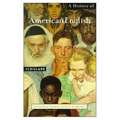 Preț: 489.26 lei
Preț: 489.26 lei - 15%
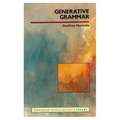 Preț: 566.52 lei
Preț: 566.52 lei -
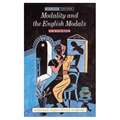 Preț: 488.29 lei
Preț: 488.29 lei - 15%
 Preț: 569.94 lei
Preț: 569.94 lei - 11%
 Preț: 327.08 lei
Preț: 327.08 lei - 18%
 Preț: 892.92 lei
Preț: 892.92 lei -
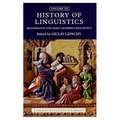 Preț: 489.26 lei
Preț: 489.26 lei - 15%
 Preț: 423.93 lei
Preț: 423.93 lei -
 Preț: 485.40 lei
Preț: 485.40 lei - 18%
 Preț: 1000.27 lei
Preț: 1000.27 lei - 18%
 Preț: 1003.12 lei
Preț: 1003.12 lei - 15%
 Preț: 669.94 lei
Preț: 669.94 lei - 15%
 Preț: 472.83 lei
Preț: 472.83 lei - 18%
 Preț: 1010.70 lei
Preț: 1010.70 lei -
 Preț: 477.99 lei
Preț: 477.99 lei -
 Preț: 487.19 lei
Preț: 487.19 lei - 18%
 Preț: 1218.08 lei
Preț: 1218.08 lei - 26%
 Preț: 1014.74 lei
Preț: 1014.74 lei - 15%
 Preț: 460.90 lei
Preț: 460.90 lei - 15%
 Preț: 562.41 lei
Preț: 562.41 lei - 15%
 Preț: 465.12 lei
Preț: 465.12 lei -
 Preț: 476.30 lei
Preț: 476.30 lei -
 Preț: 489.26 lei
Preț: 489.26 lei - 8%
 Preț: 383.06 lei
Preț: 383.06 lei
Preț: 492.59 lei
Nou
Puncte Express: 739
Preț estimativ în valută:
94.25€ • 98.68$ • 77.99£
94.25€ • 98.68$ • 77.99£
Carte tipărită la comandă
Livrare economică 05-19 aprilie
Preluare comenzi: 021 569.72.76
Specificații
ISBN-13: 9780582294783
ISBN-10: 0582294789
Pagini: 460
Dimensiuni: 138 x 216 x 24 mm
Greutate: 0.53 kg
Ediția:1
Editura: Taylor & Francis
Colecția Routledge
Seria Longman Linguistics Library
Locul publicării:Oxford, United Kingdom
ISBN-10: 0582294789
Pagini: 460
Dimensiuni: 138 x 216 x 24 mm
Greutate: 0.53 kg
Ediția:1
Editura: Taylor & Francis
Colecția Routledge
Seria Longman Linguistics Library
Locul publicării:Oxford, United Kingdom
Cuprins
Foreword
1. Historiography and institutions
2. The old and the new: data collection and data comparison
3. The discovery of Sanskrit and Friedrich Schlegel
4. Historicism, organicism and the scientific model
5. Wilhelm von Humboldt, General Linguistics and Linguistic Typology
6. Comparative and historical grammar: Rask, Bopp and Grimm
7. Comparative studies and the diffusion of linguistics
8. Theoretical discussions of the mid century
9. The Neogrammarians and the new beginnings
10. The end of the century: general perspectives
References
Index
1. Historiography and institutions
2. The old and the new: data collection and data comparison
3. The discovery of Sanskrit and Friedrich Schlegel
4. Historicism, organicism and the scientific model
5. Wilhelm von Humboldt, General Linguistics and Linguistic Typology
6. Comparative and historical grammar: Rask, Bopp and Grimm
7. Comparative studies and the diffusion of linguistics
8. Theoretical discussions of the mid century
9. The Neogrammarians and the new beginnings
10. The end of the century: general perspectives
References
Index
Notă biografică
Anna Morpurgo Davies, Giulio C. Lepschy
Descriere
In Volume IV, Anna Morpurgo Davies shows how linguistics developed as an independent discipline separated from philosophical and literary studies during the nineteenth century. During this period, earlier theoretical discussions were abandoned in favour of a more empirical and historical approach, which led to the achievement of demonstrating that languages such as Sanskrit, Latin and English are related, and derive from a parent language which is not attested but can be reconstructed.
